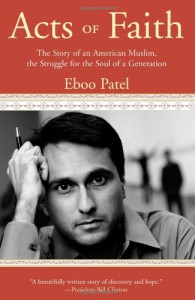 Really enjoyed this. Patel discusses his own faith journey, describes the birth of his organization (the Interfaith Youth Core, or IFYC), and outlines the need for us to create environments in which young people can explore their faith in pluralistic/interfaith settings. He manages to weave these three threads together into a really engaging story.
Really enjoyed this. Patel discusses his own faith journey, describes the birth of his organization (the Interfaith Youth Core, or IFYC), and outlines the need for us to create environments in which young people can explore their faith in pluralistic/interfaith settings. He manages to weave these three threads together into a really engaging story."This is a book," he writes, "about how some young people become champions of religious pluralism while others become the foot soldiers of religious totalitarianism. Its thesis is simple: influences matter, programs count, mentors make a difference, institutions leave their mark." He mentions encounters where adult religious leaders were more interested in developing mission statements than investing in youth programs, or who threw their hands up at the lack of interest teens seemed to express in their churches, synagogues, and mosques. But he doesn't indulge in laying blame or finger-pointing. He uses these as evidence of the need to spend more time and energy on youth programs to engage young people with their faith. "The totalitarians have put their resources into building youth programs. The pluralists haven't."
Patel is an brown-skinned American Muslim from India. If this book was simply a personal story about his faith journey and activism, it would have been a good read. I was quite impressed with his ability to bring the other threads of the book in, in quite a well-integrated way. His arguments for pluralism are forceful and compelling, and the story of building the IFYC would be useful to anyone trying to get a non-profit off the ground.
His view of pluralism is wonderfully embracing of different faith traditions. He feels strongly that interfaith dialogue deepens our understanding of our own religion. "Religious pluralism is neither mere coexistence nor forced consensus. It is a form of proactive cooperation that affirms the identity of the constituent communities while emphasizing that the well-being of each and all depends on the health of the whole.”
He formed the IFYC as a result of his desire to engage young people in more than just interfaith dialogue; to use social activism as a way to explore and share religious identity. His activist background taught him the value of engagement in what Jews call tikkun olam – healing the world through community service and social justice, while his experience of being in leadership capacities instilled in him the necessity for getting youth to become engaged on a level that helps them develop into future leaders.
He shares his frustration in trying to get the IFYC funded when he was first starting the organization:
“You should just, you know, do local fundraising for your programs," one foundation person suggested as he ushered me out of his office. I had a sudden urge to grab him by his suit jacket and say, “Do you think Osama bin Laden built Al Qaeda on bake sales?”
Patel’s book and the story of the IFYC are inspiring and forceful, but so positive and constructive. I highly recommend it.


